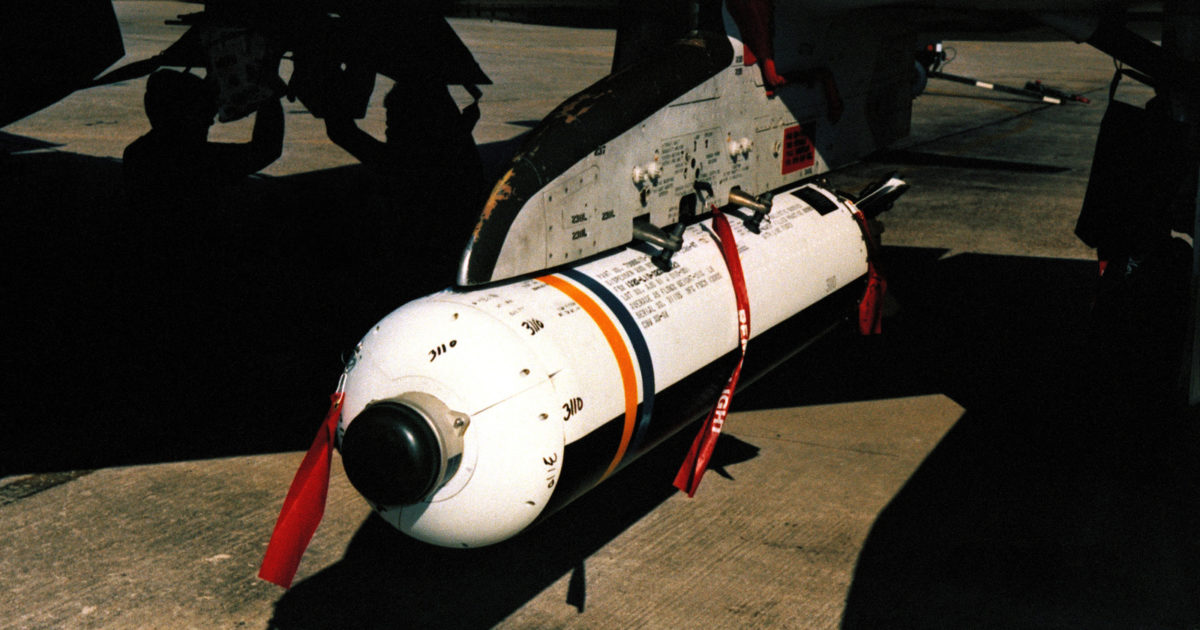READ IN ITALIAN – Bombe a grappolo: triangolo Kiev-Usa-Italia?
They are terrible weapons. They kill indiscriminately, and the victims are often children. Cluster munitions are fired from the ground or dropped from planes and drones, opening up and scattering a large number of submunitions, or small bombs, over a wide area, many of which do not explode immediately but years or decades later, wreaking havoc on civilians, especially children, who are attracted to the strange objects that are submunitions.
These arms have been banned for 13 years now, ever since the Convention on Cluster Munitions prohibiting their use, production, transfer and stockpiling came into force in August 2010. 111 countries are parties to the Convention to this day, including Italy, though major powers like the United States and Russia are not. And now the war in Ukraine threatens to set humanity back, thwarting the struggles of hundreds of civil society organizations around the world which, ever since the Vietnam War, have fought to achieve a ban. And Italy might play a role in it. The silence with which our questions have been met by U.S. and Italian authorities does not bode well. Both the U.S. Department of Defense and the Italian Ministry of Foreign Affairs led by Antonio Tajani have refused to answer, while the Italian Ministry of Defense headed by Guido Crosetto have given us only evasive answers.
Ukraine pressures the Biden Administration
With Russia’s invasion of Ukraine in 2022, cluster munitions are powerfully back on the scene. According to the international campaign that monitors these weapons, the Cluster Munitions Coalition, ever since the Convention was adopted there have been no reports or allegations of cluster munitions use by any state parties to it, and as of August 2022, Ukraine is the only country in the world where cluster munitions are in use.
Russian forces have used them extensively from the beginning, according to reports by the Cluster Munition Coalition and the Independent International Commission of Inquiry on Ukraine established by the United Nations Human Rights Council. In March 2022, then-Italian minister of Foreign Affairs Luigi Di Maio promptly condemned Russia for their use, including in densely populated areas, quoting reports received from the United Nations.
According to the Cluster Munition Coalition and the United Nations, Ukrainian forces have also used cluster munitions, but in what appear to be more limited instances. In the last month, however, they have been begging the Biden administration for U.S. cluster munitions. Although the United States, Russia and Ukraine are not parties to the Convention, the United States has not been known to use them since 2003, with one exception. Pressure on the Biden administration is mounting, however, so much so that in recent weeks four Republican senators have written a letter to the president asking him to provide them to Ukraine “immediately”.
U.S. cluster munitions at Camp Darby and Aviano
Before joining the Convention, Italy had a substantial arsenal of cluster munitions: 4044 M26 Rocket Mlrs and 59 MK 20 Rockeye: a total of 2,618,909 explosive submunitions.
According to reports by the international news agency Reuters, Ukraine is seeking MK 20s from the United States. Italian authorities claim that all of our cluster munitions have been destroyed, in an operation completed in 2015. As specialists with the Convention Implementation Support Unit based in Geneva confirm to Il Fatto Quotidiano, there are no international bodies constituted to confirm through independent inspections that such destruction actually took place. The Convention does not have a verification regime and operates on the premise of self-enforcement of its provisions.
In 2007 the United States became concerned when the Norwegian government and human rights organizations like Human Rights Watch intensified diplomatic efforts to achieve a ban on cluster munitions; although Washington did not intend to become a state party to the convention, many U.S. allies did, and the United States had several military bases in allied countries where such munitions were stockpiled including Germany, England, Japan, Qatar, Spain and Italy. Thanks to U.S. diplomatic cables revealed by WikiLeaks, we are able to learn what happened behind the scenes in those diplomatic negotiations. Cables reveal that under pressure from the Bush Administration, the Berlusconi government, along with the United Kingdom and other countries, worked to add a provision to Article 21 of the Convention ensuring that U.S. stockpiles in overseas bases would be unaffected by the Convention. In the case of Italy, the military bases where the United States stored cluster munitions were Aviano and Camp Darby.
Il Fatto Quotidiano asked the Pentagon if those armaments are still there and, if the Biden administration should decide to approve sending those munitions to Ukraine and to supply those stored in Italy, it would constitute a violation of the Convention on Cluster Munitions. The Pentagon has not responded to our questions. The Italian Ministry of Defense, headed by Crosetto, replied to our newspaper that Italy completed the destruction of its munitions in 2015. “In any case, Italy has never been a producer of cluster munitions. As far as the transfer of these weapons is concerned, except that the same is prohibited by the Convention itself, the Ministry of Defense is not the competent authority.”
Thus according to Italian Defense, although the transit of U.S. cluster munitions through Italian territory is theoretically prohibited, the ministry is not the competent authority. So who is? We received no clear answer from the Defense department. We directed our questions at Office 5 of the Italian Ministry of Foreign Affairs, which deals with Non-Proliferation, Arms Control and Disarmament, and which is the national point of contact for the Convention, reporting annually on Italy’s compliance with the Convention. Office 5 refused to answer.
If the U.S. made sure they could continue to stockpile cluster munitions at Aviano and Camp Darby despite the ban, it is reasonable to assume that those cluster munitions are still in Aviano and Camp Darby or that, in any case, the U.S. wants to reserve the right to transfer and stockpile cluster munitions present in its bases on Italian soil whenever it should deem it necessary to do so. If the Biden administration decides to supply those weapons to Ukraine, will Italy be involved?
READ IN ITALIAN – Bombe a grappolo: triangolo Kiev-Usa-Italia?

